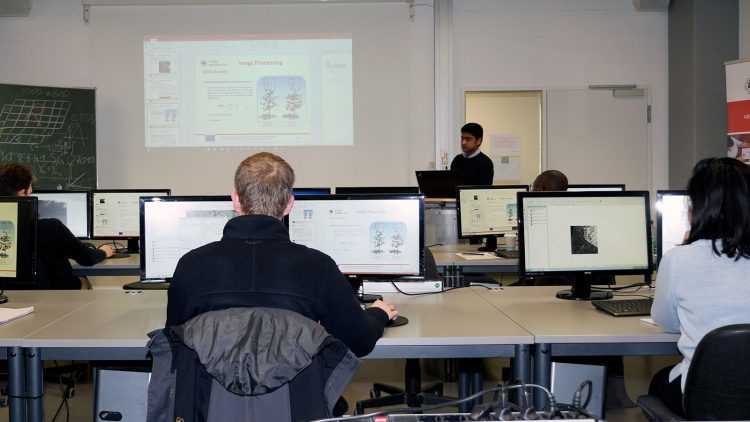Only two months after the great opening of FabSpace 2.0 Darmstadt continuous to work with the first Life-Long-Learning session at the Institute of Geodesy, TU Darmstadt in collaboration with the ESA BIC- cesah GmbH.


Only two months after the great opening of FabSpace 2.0 Darmstadt continuous to work with the first Life-Long-Learning session at the Institute of Geodesy, TU Darmstadt in collaboration with the ESA BIC- cesah GmbH.
Session Overview
The task was to study the feasibility of Copernicus data (i.e. Sentinel-2 optical images) to develop application in the field of agriculture. Optical satellite images are widely used in agriculture for monitoring crops’ health, detecting plants’ diseases and stresses, estimating crop yield etc. In recent years some farmers are practicing precision farming which partly focuses on the use of optical satellite images.
There are public optical satellite image providers who provide coarse to moderately coarse spatial resolution images at no cost, while several others provide high to very high resolution images on a commercial basis. Therefore, image cost and spatial resolution are two important issues which are considered during image procurement for agricultural application. Recently European Space Agency (ESA) provides Sentinel-2 optical images free of charge but with intermediate spatial resolution and relatively short revisit time which rank the Sentinel-2 images with high potential for use in agricultural applications.
The current challenge is faced by the company Spatial Business Integration (SBI) and their focus on answering the following questions which are considered as prerequisites of using Sentinel-2 optical images for certain agricultural applications:
Participants of the life long learning sessions hosted at TU Darmstadt.
Interaction with Users
For the first session FabSpace 2.0 Darmstadt welcomed 10 users, most of them are from TU Darmstadt and other organizations. The session was mainly steered by Md Bayzidul Islam (TU Darmstadt), welcome speech given by Prof. Dr. –Ing. Matthias Becker (TU Darmstadt), introduction to Optical Remote Sensing and Sentinel-2 conducted by Dr. –Ing. Damian Bargiel (TU Darmstadt) and conceptual speech given by Mr. Riazuddin Kawsar (SBI). The session was step by step learning by doing process where the manual of working process was provided to the participants. After the session we had the opportunity to have some valuable opinion of our users.
Further Propositions
After the scientific part of the event Sascha Heising (ESA BIC Darmstadt – cesah GmbH) joined the group to introduce the business implication of FabSpace 2.0 and to explore some opportunities in the future. “We also got some great user feedback” tell Heising and Islam after a busy 8-hour session. “University and Corporate Collaboration” model was a great achievement of this event, as FabSpace Darmstadt received monetary prize for participants sponsored by Spatial Business Integration (SBI).
The session will continue throughout the year with public-private collaboration. FabSpace Darmstadt will continue with the Startup and Innovation Day on 31. January 2017 at TU Darmstadt with a booth.